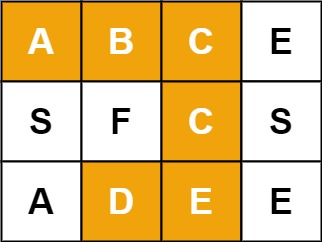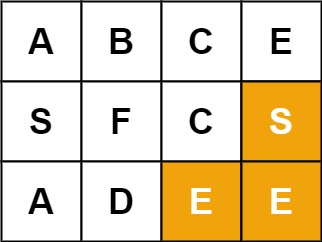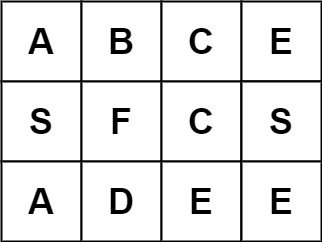Description
Given an m x n grid of characters board and a string word, return true if word exists in the grid.
The word can be constructed from letters of sequentially adjacent cells, where adjacent cells are horizontally or vertically neighboring. The same letter cell may not be used more than once.
Example 1:

Input: board = [[“A”,“B”,“C”,“E”],[“S”,“F”,“C”,“S”],[“A”,“D”,“E”,“E”]], word = “ABCCED” Output: true
Example 2:

Input: board = [[“A”,“B”,“C”,“E”],[“S”,“F”,“C”,“S”],[“A”,“D”,“E”,“E”]], word = “SEE” Output: true
Example 3:

Input: board = [[“A”,“B”,“C”,“E”],[“S”,“F”,“C”,“S”],[“A”,“D”,“E”,“E”]], word = “ABCB” Output: false
Constraints:
m == board.lengthn = board[i].length1 <= m, n <= 61 <= word.length <= 15boardandwordconsists of only lowercase and uppercase English letters.
Follow up: Could you use search pruning to make your solution faster with a larger board?
Code
DFS Failed!
問題出在 visited,因此改用 backtracking,減少 time complexity。
class Solution {
public:
bool exist(vector<vector<char>>& board, string word) {
int m = board.size();
int n = board[0].size();
for(int i = 0; i < m; i++) {
for(int j = 0; j < n; j++) {
if(board[i][j] == word[0]) {
vector<vector<bool>> visited(m, vector<bool>(n, false));
bool found = dfs(board, visited, word, 0, i, j, m, n);
if(found)
return true;
}
}
}
return false;
}
bool dfs(vector<vector<char>>& board, vector<vector<bool>> visited, string& word, int index, int i, int j, int& m, int& n) {
if(visited[i][j] ) return false;
if(index == word.length() - 1 && board[i][j] == word[index]) return true;
if(word[index] != board[i][j]) return false;
visited[i][j] = true;
if(board[i][j] == word[index]) {
bool down = i + 1 < m ? dfs(board, visited, word, index+1, i + 1, j, m, n) : false;
bool up = i - 1 >= 0 ? dfs(board, visited, word, index+1, i - 1, j, m, n) : false;
bool right = j + 1 < n ? dfs(board, visited, word, index+1, i, j + 1, m, n) : false;
bool left = j - 1 >= 0 ? dfs(board, visited, word, index+1, i, j - 1, m, n) : false;
return down || up || right || left;
} else {
return false;
}
}
};Backtracking DFS
class Solution {
public:
bool exist(vector<vector<char>>& board, string word) {
int m = board.size();
int n = board[0].size();
for(int i = 0; i < m; i++) {
for(int j = 0; j < n; j++) {
if(dfs(board, word, 0, i, j, m, n))
return true;
}
}
return false;
}
bool dfs(vector<vector<char>>& board, string& word, int index, int i, int j, int& m, int& n) {
if(index == word.length() - 1 && board[i][j] == word[index]) return true;
if(word[index] != board[i][j] || board[i][j] == '*') return false;
if(board[i][j] == word[index]) {
char temp = board[i][j];
// backtracking
board[i][j] = '*';
bool down = i + 1 < m ? dfs(board, word, index+1, i + 1, j, m, n) : false;
bool up = i - 1 >= 0 ? dfs(board, word, index+1, i - 1, j, m, n) : false;
bool right = j + 1 < n ? dfs(board, word, index+1, i, j + 1, m, n) : false;
bool left = j - 1 >= 0 ? dfs(board, word, index+1, i, j - 1, m, n) : false;
// backtracking
board[i][j] = temp;
return down || up || right || left;
} else {
return false;
}
}
};